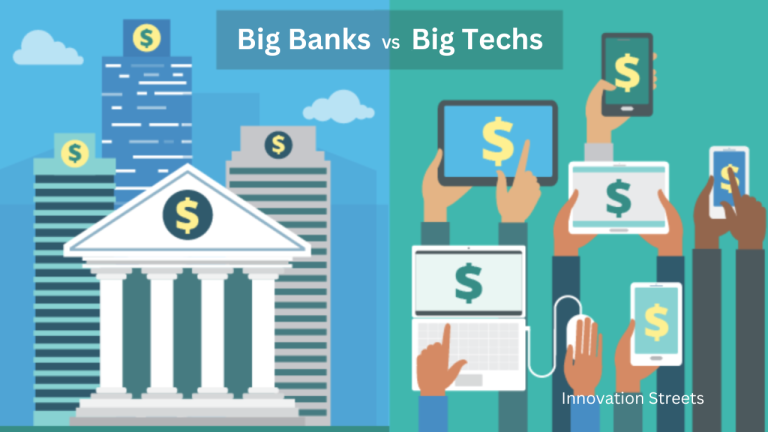Is it Big Banks vs Big Techs in 2024?
In 2024, the trending debate ‘are big techs a direct threat to big banks?’ Big tech companies including Google, Apple, and Meta have an overwhelming global reach, resources and an abundance of consumer data which gives them a competitive advantage. Whilst traditional banks have also established product market fit over the years and are deploying tech tools to keep up with the global digital transformation.
For years, large banks have dominated the financial landscape due to the trust they have built and their scale. However, with big techs coming to offer banking and financial services, the competitive dynamics in the banking and financial services industry are set to be altered.
In recent times, countries around the world are transforming digitally, creating a favourable atmosphere for expansion of big tech. These lifestyle changes have led us to adopt big tech-powered faster money transfers, payments, and other financial services. Big techs are also fundamentally agile, capable of responding swiftly to changing customer demands and market scenarios. Capturing real time data and using it to produce tailored products and services is their business.
However, to be agile and innovate at scale, big banks will require major upgrades in computational infrastructure, human resources and a renewed focus and strategy. Meta has recently introduced banking features, allowing businesses to establish their digital storefronts on Instagram and Meta platforms. Additionally, Amazon has partnered with Goldman’s Marcus to provide small businesses in the US with a $1 million line of credit. These developments prompt the crucial inquiry: “What steps will big tech take to integrate core banking services?”
Extensive and indiscriminate relaxation of participation requirements could undermine banking models and lead to heightened stability and security risks, while imposing significant barriers to entry may impede innovation, prolonging the viability of outdated banking models. Moreover, such actions could introduce novel risks into the global economy. Thus, expanding into banking is going to be equally exhaustive and expensive for technology companies. The solution for both is to respect competitive boundaries, rethink institutional structures, operations, governance and learn to respond faster to uncertainties.
Partnerships for a Better Future
Both big banks and big tech are well established in their core competencies and offerings. However, both are likely to face challenges if expanding into each other’s domain of expertise. According to a report by McKinsey, in order to preserve their market share, it is important for banks to digitally transform the end-to-end customer journey. This is an opportunity for banks and tech to partner and deliver innovative products and services to customers together.
Building independent tech infrastructure from square one, ushering in huge digital and systemic transitions and forcing their adoption, is an expensive and time-consuming way to innovate. This process could take years to materialise, with added time and capital expenditure on trials, training, and running best fit tests. It could also take a toll on the bank’s core business.

However, bridging the gap between big banks and big tech, fintech companies are well positioned to deliver financial solutions that can fairly match the requirements of big banks. Banks are deploying Fintech-as-a-Serviceand SaaS services to offer increasing functionality to their customers, who are keen to have a simple and personalised, comprehensive solution to their financial needs. Europe has long been a hotspot for API based innovation in the financial services due to its multi-currency banking, cross border trade regulations and open banking policy, it also supports the bank-fintech partnerships to drive innovation in.
This approach is efficient since fintech companies have already developed expertise in these services and are swiftly experimenting and innovating with them. They can also serve financial inclusion; help combat financial crime and improve cyber security and operational resilience of banking financial systems with emerging usecases like Generative AI, open banking and many more. This isn’t a confrontation where major technology companies seek to triumph over major banks, nor is it a scenario where banks aim to dominate tech giants. Instead, it’s a rivalry where both entities strive to capture the attention and loyalty of the customer.
—————————————————————————–
Welcome to Innovation Streets, your one-stop destination for all insights and analysis related to banking innovation, fintech, insuretech, and digital transformation. Follow us on LinkedIn and X to stay connected and informed about global insights and analyses in the financial services, IT, and Saad industries. Stay tuned for the latest trends and developments shaping these sectors.



